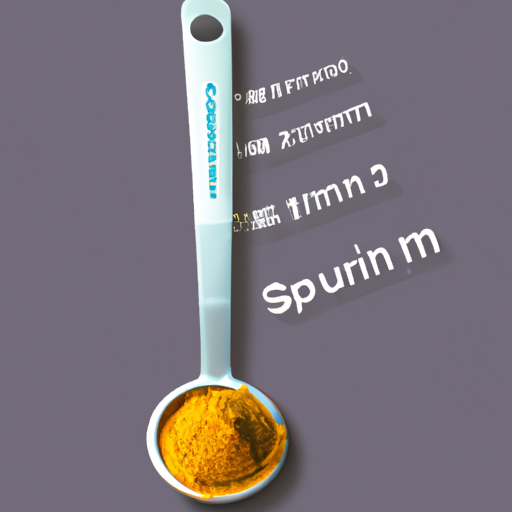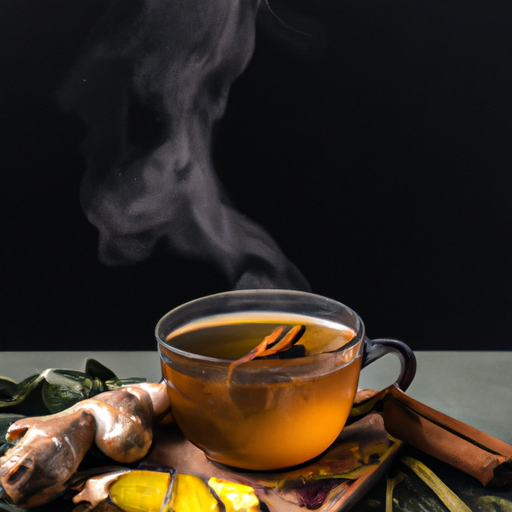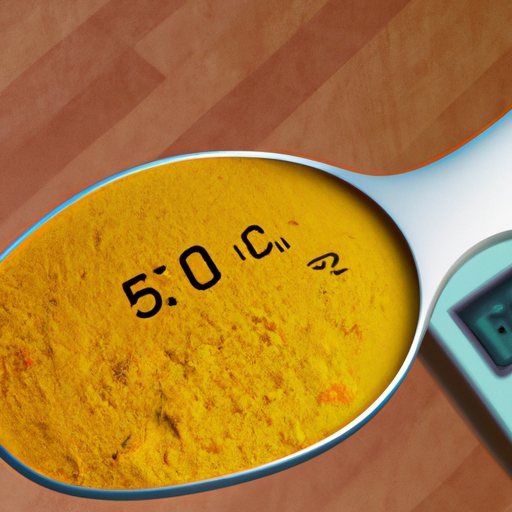As an individual who deals with high blood pressure, I have consistently searched for natural remedies to aid in managing this condition.
Recently, I have heard a lot of buzz about turmeric tea and its potential benefits for blood pressure. But before I start incorporating this beverage into my daily routine, I wanted to do some research to see if there is any evidence to support these claims.
In this article, I will be exploring the question of whether turmeric tea is good for high blood pressure. I will start by providing an overview of what high blood pressure is and what turmeric is. Then, I will dive into the research that has been conducted on turmeric and blood pressure, and discuss the recommended dosage of this tea.
I will also cover any potential side effects and precautions you should take before incorporating turmeric tea into your diet, as well as other natural ways to lower blood pressure. Finally, I will provide some tips on how to integrate turmeric tea into your daily routine and monitor your blood pressure to see if it is having any positive effects.
Key Takeaways
- Turmeric tea may be a promising natural remedy for high blood pressure due to its compound, curcumin, which has various mechanisms of action that contribute to its health benefits.
- Curcumin has been found to improve endothelial function, widen blood vessels, reduce oxidative stress and inflammation, and inhibit the renin-angiotensin-aldosterone system, all of which are major contributors to high blood pressure.
- To improve curcumin absorption, add black pepper or fats, such as coconut milk or ghee, to the tea. However, it is crucial to consume turmeric tea in moderation, as excessive intake may lead to adverse effects.
- Turmeric tea has potential side effects, including digestive problems, allergic reactions, and interference with iron absorption, which is important for individuals with iron deficiency anemia to keep in mind. Consult with your healthcare provider before incorporating turmeric into your diet, especially if you’re taking any medications.
Understanding High Blood Pressure
You might not realize it, but high blood pressure can be a silent killer, causing damage to your body without any noticeable symptoms. Understanding hypertension is crucial in managing this condition.
Hypertension is a medical condition in which the force of the blood against the walls of the arteries is too high. This puts a strain on the heart, which can lead to heart disease, stroke, and other serious health problems.
There are several causes of high blood pressure, including age, family history, obesity, smoking, and a diet high in sodium. Other factors that can contribute to hypertension include stress, lack of physical activity, and certain medications.
It’s important to understand that hypertension is a chronic condition that requires ongoing management.
Now, let’s move on to what’s turmeric and how it may help with high blood pressure.
What is Turmeric?
Often referred to as a golden spice, turmeric is a popular ingredient used in many dishes to add flavor and color. However, turmeric has also been known to have potential health benefits. Here are three ways turmeric can benefit your health:
-
Turmeric contains curcumin, a natural anti-inflammatory compound that has been shown to reduce inflammation in the body. This can be especially beneficial for those with arthritis or other inflammatory conditions.
-
Curcumin has been shown to boost levels of brain-derived neurotrophic factor (BDNF), which is a type of growth hormone that helps to support the growth and survival of brain cells. This may lead to improved memory and cognitive function.
-
Turmeric is also a potent antioxidant, which means it can help to protect your cells from damage caused by free radicals. This may help to prevent chronic diseases such as cancer, heart disease, and Alzheimer’s disease.
If you’re looking for ways to incorporate turmeric into your diet, there are many delicious turmeric recipes you can try. From turmeric tea to turmeric-spiced roasted vegetables, the possibilities are endless.
In the next section, we’ll discuss the research on turmeric and blood pressure and whether it can help to lower high blood pressure.
Research on Turmeric and Blood Pressure
I found some interesting research on the effects of turmeric on blood pressure. Studies have been conducted on both humans and animals, and the results are promising.
Potential mechanisms of action include its anti-inflammatory properties and its ability to improve endothelial function.
Studies on Humans and Animals
Numerous studies have shown that consumption of turmeric tea may lead to significant reductions in blood pressure levels in both humans and animals. Here are some interesting findings:
-
In a study published in the Journal of Nutrition and Metabolism, researchers found that consuming curcumin, the active ingredient in turmeric, for 12 weeks significantly lowered blood pressure levels in overweight individuals with high blood pressure.
-
Another study published in the Journal of Hypertension found that curcumin supplementation in rats with high blood pressure resulted in a significant decrease in blood pressure levels, as well as improvements in heart function.
-
A review of several human trials and animal studies concluded that curcumin may have a potential therapeutic effect on hypertension.
-
Additionally, turmeric has antioxidant and anti-inflammatory properties, which may also contribute to its beneficial effects on blood pressure.
Overall, these studies suggest that turmeric tea may be a promising natural remedy for high blood pressure. In the next section, we’ll explore the potential mechanisms of action behind turmeric’s blood pressure-lowering effects.
Potential Mechanisms of Action
Little did we know that the secret behind turmeric’s ability to lower blood pressure lies in its powerful antioxidant and anti-inflammatory properties. Turmeric contains a compound called curcumin, which has been shown to have various mechanisms of action that contribute to its health benefits.
Curcumin has been found to improve endothelial function, which is important in maintaining healthy blood pressure levels. It also has a vasodilatory effect, which means it can widen blood vessels and improve blood flow. Additionally, curcumin has been shown to reduce oxidative stress and inflammation in the body, both of which are major contributors to high blood pressure.
Furthermore, curcumin has been found to inhibit the renin-angiotensin-aldosterone system, which is a major regulator of blood pressure. This system produces hormones that constrict blood vessels, leading to increased blood pressure. By inhibiting this system, curcumin can help to lower blood pressure levels.
These mechanisms of action make turmeric tea an effective natural remedy for high blood pressure. However, it’s important to note that more research is needed to fully understand the potential benefits of turmeric tea for blood pressure regulation.
Moving on to the next section, it’s important to consider the recommended dosage of turmeric tea for optimal health benefits.
Recommended Dosage of Turmeric Tea
When it comes to consuming turmeric, it’s important to consider the recommended dosage. The amount of curcumin, the active ingredient in turmeric, can vary depending on the form it’s taken in. Additionally, it’s important to be aware of safe limits and potential interactions with medications when consuming turmeric.
Adjust the paragraph structure in the Input to logically group complete sentences on their own lines, with a double new line after. Use contractions.
Amount of Curcumin in Different Forms
You can find curcumin in various forms, such as turmeric powder, supplements, and extracts, each with varying amounts of the beneficial compound. However, the amount of curcumin that the body can absorb and utilize varies depending on the form in which it is consumed.
For instance, turmeric powder has low bioavailability, meaning that the body may not absorb and utilize the curcumin in it effectively. On the other hand, supplements and extracts may have higher bioavailability, allowing the body to absorb more curcumin. Additionally, research shows that combining turmeric with black pepper or fats may enhance curcumin absorption.
To maximize the benefits of turmeric tea, it is important to prepare it properly. To improve curcumin absorption, add black pepper or fats, such as coconut milk or ghee, to the tea. Moreover, it is crucial to consume turmeric tea in moderation, as excessive intake may lead to adverse effects.
In the next section, we’ll explore the safe limits of turmeric tea and its potential interactions with medications.
Safe Limits and Interactions with Medications
It’s important to be mindful of the safe limits and potential interactions with medications when incorporating turmeric into your diet, especially if you have high blood pressure. While turmeric has been shown to have potential health benefits, consuming excessive amounts can be harmful and may lead to unwanted side effects.
It’s recommended to consume no more than 1500mg of turmeric per day, which is equivalent to about 1 teaspoon of turmeric powder.
In addition, turmeric may interact with certain medications, such as blood thinners and diabetes medications, and may affect their effectiveness or cause adverse reactions. Therefore, it’s important to consult with your healthcare provider before incorporating turmeric into your diet, especially if you’re taking any medications.
By being mindful of safe consumption levels and potential interactions with medication, you can reap the potential benefits of turmeric without any negative consequences.
When incorporating turmeric into your diet, it’s also important to be aware of potential side effects of turmeric tea.
Potential Side Effects of Turmeric Tea
As I researched turmeric tea, I came across some potential side effects that people should be aware of.
One of the commonly reported issues is digestive problems such as nausea, bloating, and diarrhea.
Some individuals may also experience allergic reactions, particularly if they’re allergic to other members of the ginger family.
Additionally, turmeric can interfere with iron absorption, which is important for individuals with iron deficiency anemia to keep in mind.
Digestive Issues
Turmeric tea can help alleviate digestive issues, promoting gut health with its anti-inflammatory and antioxidant properties. Here are some of the benefits of turmeric tea for digestive issues:
-
Relieves bloating: Turmeric tea has been shown to reduce gas and bloating, making it a great natural remedy for those who experience discomfort after meals.
-
Aids digestion: Turmeric tea stimulates the production of bile, which is essential for breaking down fats and absorbing nutrients in the small intestine.
-
Soothes inflammation: Inflammation in the gut can lead to discomfort and digestive issues. Turmeric tea’s anti-inflammatory properties can help reduce inflammation and soothe the gut lining.
It’s important to note that while turmeric tea can be beneficial for digestive issues, it may not work for everyone. Some individuals may have allergic reactions to turmeric, which can lead to more severe digestive problems.
Allergic Reactions
If you’re prone to food allergies, it’s important to be cautious when consuming turmeric tea. Although it’s generally considered safe, some individuals may experience allergic reactions to turmeric, which can cause severe digestive problems. Symptoms of allergies may include hives, swelling of the face or throat, difficulty breathing, and anaphylaxis. If you experience any of these symptoms after consuming turmeric tea, seek medical attention immediately.
It’s important to note that turmeric can also interfere with iron absorption. This is especially concerning for individuals with iron-deficiency anemia who rely on iron supplements or a diet high in iron-rich foods to maintain healthy levels.
In the next section, we’ll explore the effects of turmeric tea on iron absorption and how it can impact individuals with iron-deficiency anemia.
Interference with Iron Absorption
Individuals who rely on iron supplements or iron-rich diets to maintain healthy levels may want to be cautious when consuming turmeric tea due to its potential interference with iron absorption. Turmeric contains compounds called polyphenols which can bind to iron and prevent its absorption in the body.
This can lead to a decrease in iron levels, which is especially concerning for individuals who already have low iron levels or anemia. The health implications of decreased iron absorption can range from mild symptoms such as fatigue and weakness to more severe complications such as anemia and impaired immune function.
It’s important for individuals with iron deficiencies to monitor their turmeric tea intake and consider alternative sources of iron. Incorporating vitamin C-rich foods such as citrus fruits or peppers can help improve iron absorption when consuming turmeric tea.
It’s also recommended to talk to a healthcare provider before adding turmeric tea to your diet to ensure it’s safe and appropriate for your individual health needs.
Precautions Before Adding Turmeric Tea to Your Diet
Before adding turmeric tea to your diet, it’s important to note that consuming too much can lead to an upset stomach, according to a study published in the Journal of Medicinal Food. While turmeric tea benefits include potentially lowering blood pressure, it’s important to consume it in moderation and be aware of potential side effects.
When brewing turmeric tea, it’s recommended to use fresh turmeric root or a high-quality turmeric powder. Add a teaspoon of turmeric to a cup of boiling water, along with a pinch of black pepper to enhance the absorption of curcumin, the active ingredient in turmeric. If the taste is too strong, consider adding honey, lemon, or ginger to your turmeric tea.
Alternatively, if you’re looking for turmeric tea alternatives, consider trying ginger or hibiscus tea, both of which have been shown to help lower blood pressure.
Moving forward, it’s important to explore other natural ways to lower blood pressure, such as exercise, reducing salt intake, and incorporating more fruits and vegetables into your diet. By taking a holistic approach to managing high blood pressure, you can improve your overall health and reduce your risk of developing complications associated with high blood pressure.
Other Natural Ways to Lower Blood Pressure
Incorporating regular exercise, reducing salt intake, and increasing fruit and vegetable consumption are effective ways to naturally manage and lower elevated blood pressure levels. Yoga exercises, in particular, have been shown to have a positive impact on blood pressure. Studies have found that practicing yoga for as little as 30 minutes a day can significantly reduce blood pressure in individuals with hypertension.
In addition to exercise, making dietary changes is also crucial in managing high blood pressure. Eating a diet rich in fruits, vegetables, whole grains, and low-fat dairy products while limiting saturated and trans fats, cholesterol, and added sugars can make a significant difference in blood pressure levels. Consuming foods high in potassium, such as bananas, sweet potatoes, and spinach, can also help lower blood pressure.
By adopting these natural lifestyle changes, individuals can take control of their blood pressure and potentially avoid the need for medication. When it comes to incorporating turmeric tea into your diet, it’s important to keep in mind that it shouldn’t be used as a substitute for prescribed medications or as the sole method of managing high blood pressure. However, adding turmeric tea to a healthy lifestyle that includes regular exercise and a balanced diet can potentially provide additional benefits in managing blood pressure.
Integrating Turmeric Tea into Your Diet
If you’re looking for a spicy and flavorful addition to your diet, consider adding a cup of golden goodness to your daily routine. Turmeric tea has been shown to have numerous health benefits, including its potential to lower high blood pressure. This powerful spice contains an active ingredient called curcumin, which has been linked to reducing inflammation and improving blood vessel function.
To reap the benefits of turmeric tea, there are various recipes and brewing methods to choose from. One popular recipe involves simmering water, turmeric, ginger, and honey for several minutes before straining and enjoying. Another variation includes adding black pepper to the mix, as it has been shown to increase the absorption of curcumin in the body. Experiment with different recipes and brewing methods to find what works best for you, and enjoy this delicious and healthy beverage as a part of your daily routine.
Transitioning into the subsequent section about monitoring your blood pressure, it’s important to note that while turmeric tea may have potential benefits for high blood pressure, it should not be relied upon as the sole method of treatment. It’s always important to monitor your blood pressure and consult with your healthcare provider to ensure that you are taking the necessary steps to maintain a healthy blood pressure level.
Monitoring Your Blood Pressure
Now that we know how to incorporate turmeric tea into our daily routine, it’s important to monitor our blood pressure regularly. High blood pressure, also known as hypertension, is a common condition that affects millions of people worldwide. It can lead to serious health problems such as heart attack, stroke, and kidney disease if left untreated.
Therefore, monitoring your blood pressure is crucial in maintaining good health. Fortunately, monitoring your blood pressure is easy and convenient with the use of home blood pressure monitors. These devices are widely available and can be purchased online or at your local pharmacy.
By regularly checking your blood pressure at home, you can keep track of your readings and make necessary lifestyle changes to improve your health. Lifestyle changes such as eating a healthy diet, exercising regularly, reducing alcohol and tobacco consumption, and managing stress can help lower your blood pressure and improve overall health.
Frequently Asked Questions
How does turmeric tea affect other medications I am currently taking for high blood pressure?
I need to be cautious about potential drug interactions while taking turmeric tea with high blood pressure medications. Research on its effectiveness compared to other natural remedies is inconclusive.
Can turmeric tea be harmful if I have a history of liver or gallbladder problems?
My liver function and digestive issues are important to consider before consuming turmeric tea. Turmeric can worsen liver problems and cause digestive discomfort, so it’s best to consult with a healthcare provider first.
Is it safe to consume turmeric tea if I am pregnant or breastfeeding?
As a pregnant or breastfeeding individual, it is important to consider the safety concerns of consuming turmeric tea. While turmeric tea benefits overall health, there is limited research on its safety during pregnancy and breastfeeding. It is recommended to consult with a healthcare provider before consuming.
Can turmeric tea be consumed in excess and if so, what are the potential side effects?
Although turmeric tea is generally safe, excessive consumption can lead to potential risks and overdose symptoms such as nausea and diarrhea. It’s important to maintain moderate intake and consult with a healthcare provider if experiencing any adverse effects.
How long does it take for turmeric tea to lower blood pressure and how often should it be consumed for maximum benefits?
To maximize the benefits of long term turmeric tea consumption for high blood pressure, I recommend a daily dosage of 500-2000mg of curcumin. While turmeric tea may have some effectiveness, other natural remedies like exercise and a healthy diet may be more effective.
Conclusion
After researching the effects of turmeric tea on high blood pressure, I’ve come to the conclusion that it can be a beneficial addition to one’s diet.
While more studies are needed to fully understand the extent of its effects, preliminary research shows promise in turmeric’s ability to lower blood pressure and reduce inflammation.
However, it’s important to note that turmeric tea shouldn’t be relied upon as the sole method of managing high blood pressure.
Incorporating a variety of natural methods, such as regular exercise and a balanced diet, can work together to promote overall cardiovascular health.
So, while turmeric tea may be a helpful tool in the fight against high blood pressure, it should be approached as just one part of a larger strategy.










